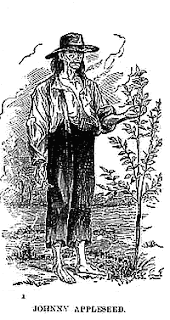 “John Chapman is a hero for our time - his philanthropy, his selflessness, his Christian faith. Chapman was also America’s first environmentalist.”
“John Chapman is a hero for our time - his philanthropy, his selflessness, his Christian faith. Chapman was also America’s first environmentalist.”  Most of what’s known about Chapman comes from accounts left by the many settlers who welcomed him into their cabins, offering the famous appleman/evangelist a meal and a place to sleep. In exchange, his hosts were happy to have Chapman’s news (of Indians and Heaven, of his own fantastic exploits) and apple trees (he’d usually plant a couple as a token of his thanks).
Most of what’s known about Chapman comes from accounts left by the many settlers who welcomed him into their cabins, offering the famous appleman/evangelist a meal and a place to sleep. In exchange, his hosts were happy to have Chapman’s news (of Indians and Heaven, of his own fantastic exploits) and apple trees (he’d usually plant a couple as a token of his thanks).
There was, too, the sheer entertainment value of a guest who was, literally, a legend in his own time.
- To a pioneer laboring under the brute facts of frontier life, confronting daily the indifferent face of nature, Johnny Appleseed’s words and seeds offered release from the long sentence of ordinariness, held out a hope of transcendence.
 Johnny Appleseed preferred to spend his nights out of doors… a vegetarian living on the frontier, he deemed it a cruelty to ride a horse or chop down a tree; to punish his own foot for squashing a worm, he wore no shoes, even in the snowy winter. He liked best the company of Indians and children. The Indians regarded Chapman as a brilliant woodsman and medicine man.
Johnny Appleseed preferred to spend his nights out of doors… a vegetarian living on the frontier, he deemed it a cruelty to ride a horse or chop down a tree; to punish his own foot for squashing a worm, he wore no shoes, even in the snowy winter. He liked best the company of Indians and children. The Indians regarded Chapman as a brilliant woodsman and medicine man.
Johnny lived everywhere and nowhere. He was constantly on the move, travelling in Autumn to Allegheny County (in western Pennsylvania) to gather seeds, scouting nursery sites and planting in the spring, repairing fences at old nurseries in summer, and wherever he planted, signing up local agents to keep an eye on and sell his trees, since he was seldom in one place long enough to do that work himself…
- Like a shrewd real estate developer (which is one way to describe him), Chapman had a sixth sense for exactly where the next wave of development was about to break. There he would go and plant his seeds on a tract of waterfront land (sometimes paid for, sometimes not), confident in the expectation that a few years hence a market for his trees would appear at his doorstep. By the time the settler came, he’d have two- or three-year-old trees ready for sale... In time he would find a local boy to look after his trees, move on, and start the process all over again.
 Johnny was apparently the only appleman on the American frontier pursuing such a strategy. It would have large consequences for both the frontier and the apple. He was an agent of domestication. With every cider orchard he helped plant, the wilderness became that much more hospitable and homelike. It was said that his millions of seeds and thousands of miles changed the apple, and the apple changed America.
Johnny was apparently the only appleman on the American frontier pursuing such a strategy. It would have large consequences for both the frontier and the apple. He was an agent of domestication. With every cider orchard he helped plant, the wilderness became that much more hospitable and homelike. It was said that his millions of seeds and thousands of miles changed the apple, and the apple changed America.
By the 1830s John Chapman was operating a chain of nurseries that reached all the way from western Pennsylvania through central Ohio and into Indiana. He died in 1845, leaving an estate some 1,200 acres of prime real estate.
Chapman saw himself as a bumblebee on the frontier, bringer of both the seeds and the word of God – of both sweetness, that is, and light.

Chapman’s ability to freely cross borders that other people believed to be fixed and unbreachable – between the red world and the white, between wilderness and civilization, even between this world and the next – was one of the hallmarks of his character and probably the thing that confounded people about the man, both then and now.
source: The Botany of Desire
Below is a Walt Disney movie clip on Johnny Appleseed.
part 2

No comments:
Post a Comment